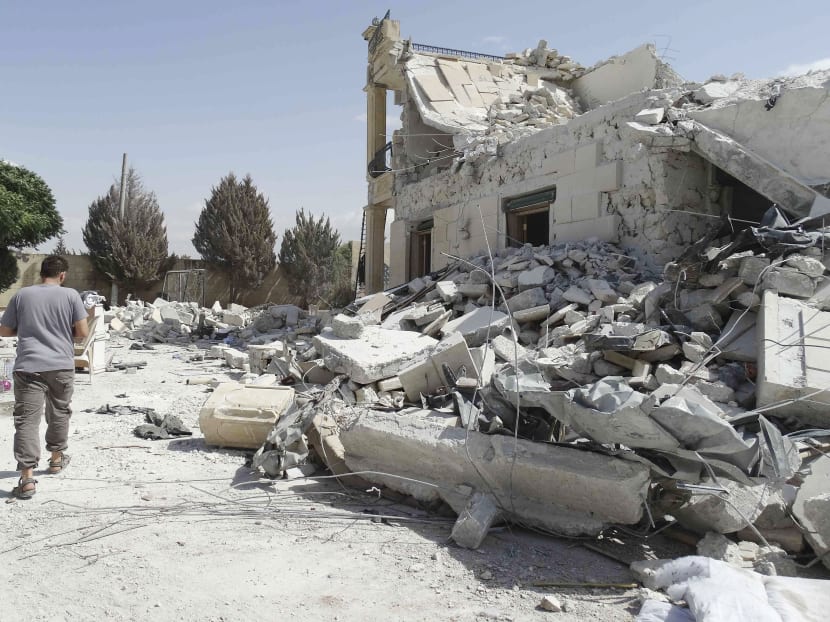Malaysians ‘sacrifice it all’ to battle for Islamic State
Kuala Lumpur — Mr Ahmad Salman Abdul Rahim chose to leave his job at a Malaysian construction firm to fight alongside jihadists in Syria for a reason he said is 1,400 years old: The Prophet Muhammad demands it.

A militant base damaged by US-led air strikes in Aleppo, Syria. As the US attacks militant strongholds, hundreds of South-east Asians have gone to fight for the Islamic State. Photo: Reuters
Kuala Lumpur — Mr Ahmad Salman Abdul Rahim chose to leave his job at a Malaysian construction firm to fight alongside jihadists in Syria for a reason he said is 1,400 years old: The Prophet Muhammad demands it.
Muhammad, the founder of Islam, once advised a companion to fight in the area that makes up modern-day Syria and predicted that Allah would send an “army of mujahideen” to the region, said Mr Ahmad, adding that he was in Syria to avenge Muslims tortured and killed by President Bashar Assad’s regime.
“We are portrayed as terrorists, but I don’t care as this affair is between me and God,” he said via Facebook messages from near Kfar Zeta in Syria’s Hama region.
“Many of the end-of-times battles will happen around Syria. That’s among the reasons I am here,” added Mr Ahmad, 38, who was educated in the United Kingdom.
As nations around the world grapple with the threat of the Islamic State militant group, with air strikes led by the United States pounding militant strongholds in Syria, South-east Asians fighting in the Middle East pose a risk in several ways, security analysts have said.
They could return and breathe new life into militant groups in a region with a history of extremism and occasional large-scale terror attacks, and could radicalise friends and family at home via social media, aided by slick Islamic State promotional videos.
“It is not the IS per se that may pose a danger to the region but, rather, its extreme militant ideology as well as the skills, battleground experience and international networks that South-east Asian jihadists got from Syria and Iraq,” said Ms Navhat Nuraniyah, an associate research fellow at Singapore’s S Rajaratnam School of International Studies who looks into terrorism and radicalisation.
“If even a small minority of them do return, they will be highly respected by existing local groups,” she added. “If they do intend to continue their mission, they will have no problem finding recruits and support.”
The total number of South-east Asians fighting alongside the Islamic State is estimated by governments and the police to be a few hundred.
Among those overseas is Mr Akel Zainal, the drummer from a 1990s Malaysian pop group known for songs such as You’re The Only One. From Syria, he solicits requests from Facebook followers to write their names on mortar shells, printing their names — as many as five per shell — next to the phrase Malaysian Citizens Together with the Islamic Revolution.
“US soldiers and other infidel armies usually write names on bombs they use on Muslims as a taunt,” said Mr Akel on his Facebook page, which showed photos of him walking through the rubble of buildings destroyed by Syrian forces, with a gun slung across his back.
“Is it wrong then for me to want to taunt them back — these enemies of Allah? It’s my idea, it’s my way of sharing the fervour of the battlefields with my friends. Eat. Pray. Jihad.”
The counterterrorism division of the Malaysian police force has identified Mr Ahmad and Mr Akel as among those who have gone to Syria and Iraq to fight, said Mr Ayob Khan Mydin, deputy chief of the unit.
As many as 40 Malaysians may be there and the police have not identified all of them, he added.
“This is the first time a state committed to the application of Islamic law is actually winning victories and controlling oil, controlling territory and attracting an international body of fighters,” said Ms Sidney Jones, director of the Jakarta-based Institute for Policy Analysis of Conflict.
Foreign fighters have been linked to the beheading of aid workers and journalists in the Middle East. American journalist James Foley was beheaded in a video released last month, in which the executioner preached jihad with an English accent.
Mr Mohammad Fadhlan, 21, left an Islamic boarding school in Kedah in May to travel to Syria. He received instructions on getting there by contacting Mr Lotfi Ariffin, a former official with an Islamic political party who is seen as the leader of the Malaysians in Syria, through social media.
“His dream was to go to Syria to join the jihad,” recalled his classmate, Mr Ameerul Hafeez. Mr Lotfi and Mr Fadhlan were killed earlier this month in the same battle.
While Mr Ahmad fights on in Syria, his family frets at home. “There’s a bit of sadness, a bit of pride and fear that we will lose him,” said his sister Aini Salina.
Mr Ahmad said he doubted that he would see Malaysia again, given the risk of arrest. And if he did, he would not commit violence in his home country.
“I left behind all of life’s luxuries for Islam,” he added. “I am sacrificing it all.” BLOOMBERG






